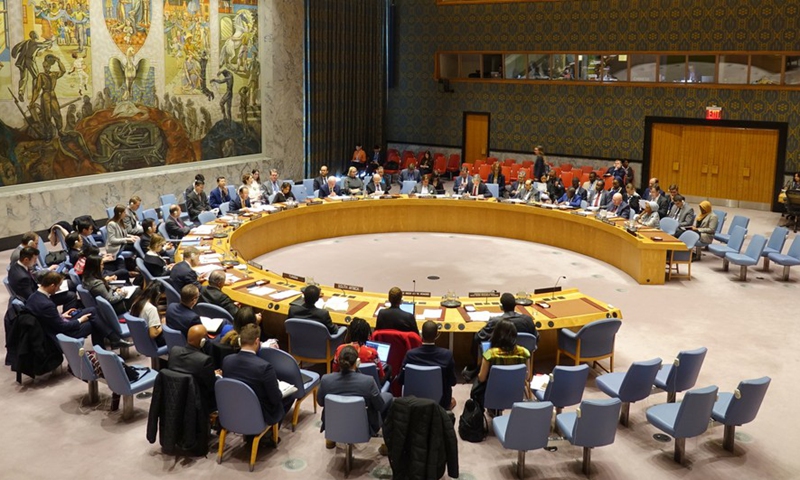Experts warn of anti-terrorism challenges amid COVID-19, calling for cooperation
By Wang Qi Source: Global Times Published: 2020/9/18 17:03:40

Photo taken on March 11, 2020 shows the UN Security Council Debate on Countering Terrorism and Extremism in Africa at the UN headquarters in New York.File photo:Xinhua
Human rights and anti-terrorism experts from China and Cameroon on Thursday warned about the challenge of anti-terrorism on social media amid the COVID-19 pandemic and lack of world leadership.
Ideas and experiences regarding counter-terrorism, de-radicalization, and human rights protection were exchanged in an online seminar, which was jointly sponsored by the permanent mission of China and Cameroon to the UN Office at Geneva and Other International Organizations in Switzerland.
UN Secretary-General António Guterres once pointed out that terrorism, similar to a virus, does not respect national borders, which infects all nations and can only be defeated collectively. Observers believe that the COVID-19 pandemic has posed new challenges for the global fight against terrorism, and it is of utmost importance to further promote multilateralism and international cooperation to tackle the new and evolving challenges of terrorism.
Fan Juanrong, a professor from the Chinese Academy of Social Sciences, pointed out that international terrorism has ramped up amid the pandemic.
According to Fan, ISIS has launched over 100 terrorist attacks in Iraq in August. Al Qaeda is also active with more than 20 branches, including 40,000 members, spreading rapidly amid the pandemic.
The reason for the resurgence of terrorism, according to Fan, is the pandemic and the following recession that has forced many countries to put anti-terrorism in the background.
"The US was more concerned with geopolitics and withdrew its counterterrorism forces from Iraq amid the pandemic… Western countries have cut their counter-terrorism budgets and reduced their aid," said Fan.
Hassan Njoya, a lecturer at the University of Buea in Cameroon, raised another concern about extremism and terrorism's presence on social media like Facebook, Twitter, and Whatsapp.
Governments need to pay close attention to social media, on which terrorists can remotely control terrorist activities, propagate terrorist recruitment and increase influence, said Njoya, noting that over 2,000 Cameroonians have been recruited via social media.
Video clips and images about massacres and violence spreading online has a great impact on young people who were not educated enough, Njoya said.
Njoya said the Cameroonian government has screened content on social media, and aroused higher public awareness of anti-terrorism through community dialogue and social media publicity. He said social media could also be used as a weapon of governments.
Some Chinese experts shared China's experiences about counter-terrorism and de-radicalization in Xinjiang Uygur Autonomous Region, where terrorism and extremism have been basically been tamed.
With a high sense of responsibility, the Chinese government has improved various laws to combat extremism and terrorism. Poverty is a breeding ground for terrorism. The Chinese government has actively improved people's livelihoods and promoted Xinjiang's economic and social development in areas such as characteristic industries, education, medical care, e-commerce and tourism, said Xu Jianning, a professor at the Chinese Academy of Social Sciences.
Xu said China's vocational training and education centers in Xinjiang region play an important role in curbing terrorism and extremism, rather than a violation of human rights. "Training centers help people affected by terrorism to learn legal knowledge, the common language of the country, and professional skills to eliminate radicalization in order to better integrate them into society in the future."
Some countries question Xinjiang's efforts to fight terrorism and eliminate extremism, stigmatizing China under the guise of human rights, religion and ethnicity. But the fact is that vocational training and education centers are in line with the spirit of the UN and improve the actual situation in Xinjiang, said Jiang Wang, another researcher from the Chinese Academy of Social Sciences.
China has long responded actively to UN resolutions to combat separatism, terrorism and extremism, and faced challenges together with the international community, said Wang, calling for a wider range of International judicial cooperation.
The seminar was organized by the Institute for Communication and Borderland Governance & the School of Journalism and Communication at Jinan University in South China's Guangdong Province.
Posted in: SOCIETY